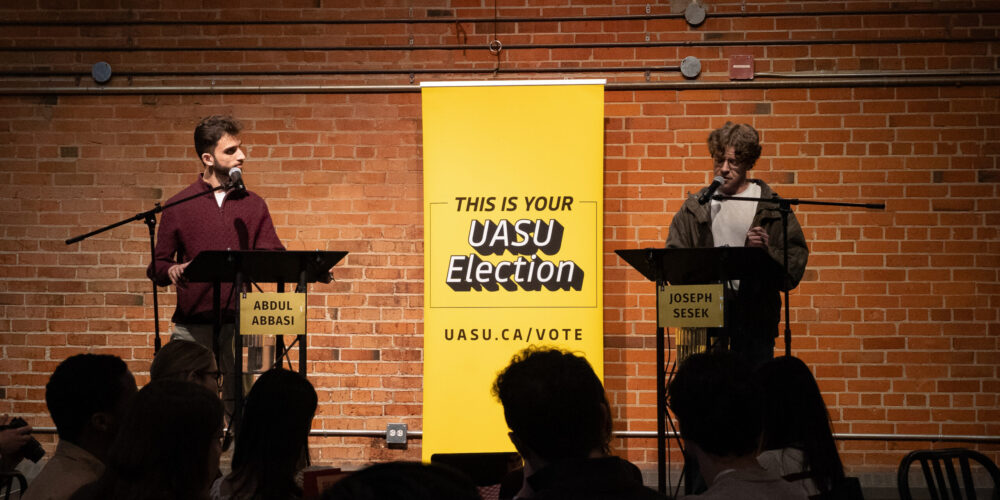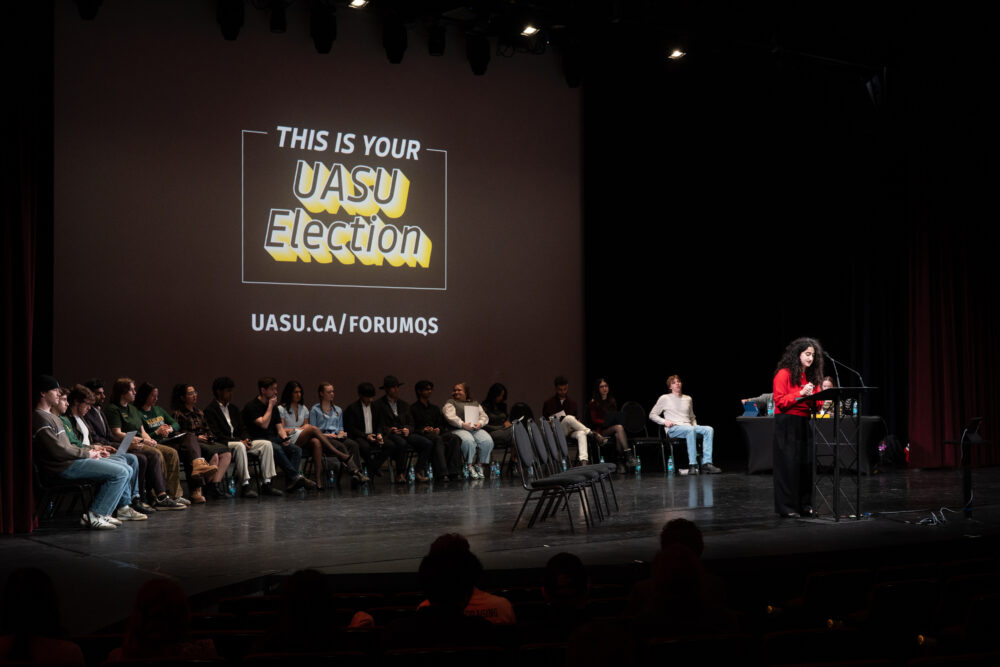U of A cuts funding to university-affiliated daycares, effective January 2026
“It turns out that this is actually an issue that many and all associations care about. And the members of all associations are deeply disappointed in the university's choice here,” Postdoctoral Fellows Association vice-president (internal) says.
 Helen Zhang
Helen ZhangOn January 10, the executive directors of six university-affiliated daycare centres were informed of the University of Alberta’s decision to withdraw funding from all six daycare centres, effective January 2026.
The funding that the U of A has committed to the university-affiliated daycare centres is 0.0154 per cent of its operating budget, roughly $298,600 per year. According to Brenda Drozd, the executive director of the Hospitals and Community Child Care Centre, the U of A cited “cost saving measures” as the reason for the funding cut.
According to Kimberly Gravel, the executive director of the University Infant Toddler Centre (UITC), at first, funding from the U of A was primarily used for rent and janitorial costs. The usage of the funding evolved over time, changing to accommodate each centre’s needs.
Funding to the centres was also influenced by the volume of infants that the centres take and the cost of the building’s rent.
This is not the first time that the U of A has cut funding to these centres. In 2019, right before the COVID-19 pandemic, the centres experienced significant funding cuts. Since then, funding to the daycare centres has gradually decreased and will be fully eliminated in January 2026.
“It was disappointing that there was no consultation,” Gravel says
Louise Booker, the executive director of the University and Community Early Learning Centre (UCELC), said that the U of A has had a formal agreement with the UCELC to provide funding since the early 1980s.
The other centres have similar agreements, with the U of A finalizing agreements to fund the centres throughout the 1980s, 1990s, and early 2000s. As part of the agreement, the centres needed to give university families a high percentage of priority, Booker said.
Drozd said that the centres’ mission is to “provide quality early learning and childcare for the families and children of our community.”
Additionally, the centres also provide support and research opportunities to the U of A, according to Angie Clark, executive director of the McKernan Child Development Centre (MCDC). The centres often work with the department of linguistics at the U of A, helping them and other departments with various areas of research, Clark said.
Gravel said that none of the daycare centres were consulted in the decision to cut funding.
“It was disappointing that there was no consultation. We weren’t anything more than a budget line, which is so unfortunate,” Gravel said.
According to Gravel, the daycare centres wrote and sent a response letter to the university on March 25, expressing their “lack of comfort” with the decision and asking for the decision to be reversed.
“We said … how we’ve supported the university and how important the funding was, and that the provincial cutbacks or changes to funding has actually put pressure on us. Our fee revenue has been rolled back. That, in combination with this cut, leaves us in very difficult positions,” Gravel said.
The U of A responded to that letter with another letter, stating that it is not going to reverse its decision.
“It turns out that this is actually an issue that many and all associations care about,” Baggaley says
Upon finding out about the U of A’s decision to cut daycare funding, Quinn Benders, president of the Non-Academic Staff Association (NASA), and Michael Baggaley, vice-president (internal) of the Postdoctoral Fellows Association (PDFA) and parent of a child at the UITC, formed a coalition with the Graduate Students’ Association (GSA), U of A Students’ Union (UASU), and Association of Academic Staff at the U of A (AASUA).
“We were shocked to hear that and we decided to try to do something about it,” Benders said.
The coalition co-signed and sent a letter to the U of A, following the letter sent by the university-affiliated daycares. The letter urged the university to reverse its decision to cut funding, conduct a collaborative policy review, and commit to a sustainable investment in affiliated childcare.
“It turns out that this is actually an issue that many and all associations care about. And the members of all associations are deeply disappointed in the university’s choice here,” Baggaley said.
Baggaley said that this decision is going to significantly affect postdoctoral scholars at the U of A. Many postdoctoral scholars are international scholars, who are increasingly vulnerable if they have to move their family from another country. Additionally, a typical salary for postdoctoral scholars is roughly $40,000.
“Any added or additional cost burden for [postdoctoral scholars] is going to be detrimental to their quality of life,” Baggaley said.
Many parents have expressed concern over the U of A’s decision to cut daycare funding. Emily Grisé, an assistant professor in the department of earth and atmospheric sciences and parent of a child at the UITC, is just one parent that has raised concerns.
“As a family unit, we [have] always been so appreciative of [the] UITC and everything that they do — they do more than just delivering childcare. And I just know that [it] is well above the level of care and standard that [my child] would receive at another more local daycare,” Grisé said.
“We just don’t know what the next year will look like,” Clark says
In terms of short-term consequences, the daycare centres are trying to prepare for the lack of support that they will receive in January 2026, Gravel said.
“I think we’re just in a state of transition, and that’s what’s challenging for everybody right now, is we just don’t know what the next year will look like,” Clark said.
Long-term consequences of this decision will mean less priority for university families, changes to the programming at the centres, higher fees, cutting non-essential expenses like field trips, and decreased quality of staff, Booker and Gravel said.
“We’re going to have to look at a number of things that are not going to be positive,” Gravel said.
“The main thing that will change is quality and the type of programming,” Booker said.
Grisé is concerned that this decision will also affect the volume of infants that these centres will be able to facilitate. Childcare centres have particular staff to child ratios that they need to uphold. Because of this, if the centres have to reduce the number of staff, the amount of children in their facilities will be reduced as well.
Additionally, Benders stated that “this decision means, ultimately, that low income earners [and] low income families are going to be paying more for less and it’s inequitable. It goes against some of the university-stated purposes and ideals, and I would like to see that they reverse that decision.”
According to Benders, this decision will also undermine the U of A’s retention of faculty and staff because there will be “no adequate childcare close by or [parents will be] paying a premium for less quality of care.”
“From my perspective, it kind of exemplifies a systematic undervaluation of care work and that disproportionately impacts marginalized workers, or particularly women and particularly low income workers staff,” Benders said.
“I would really like to see the university expand the number of centres that they’re affiliated with,” Baggaley says
The ultimate goal for the coalition, in solidarity with the daycare centres, is for the U of A to reverse its decision to cut funding, according to Benders. Additionally, they hope to renew the 2003 childcare policy, which provides funding for parents to pay for childcare.
“What I would like to see ultimately, is for [the university] to reverse that decision and make a commitment to long-term, affordable, and stable childcare that services the community of the U of A,” Benders said.
“I would really like to see the university expand the number of centres that they’re affiliated with, and expand the funding for these programs as well,” Baggaley said.
“The university, I think, should be a leader in terms of supporting and ensuring that these university-affiliated daycares can thrive and have the supports that they need in order to serve their students, faculty, staff,” Grisé said.
CORRECTION: A correction was made at 11:14 a.m. on May 15 to remove the use of the word students when referring to postdoctoral scholars. The Gateway regrets this error.
CORRECTION: A correction was issued at 8:14 p.m. on May 15 to correct the quote from Benders that mistakenly said health care instead of childcare. The Gateway regrets this error.




